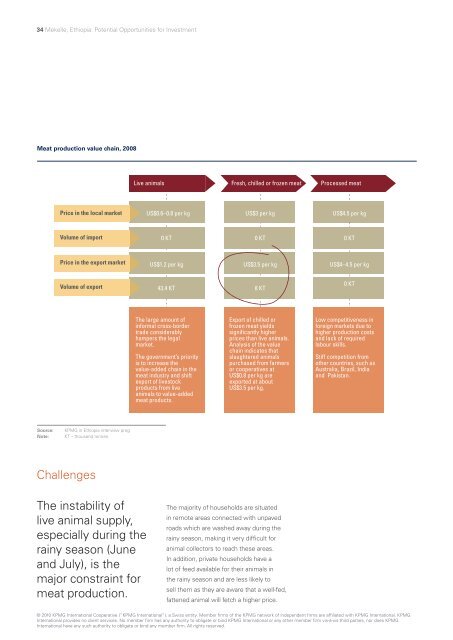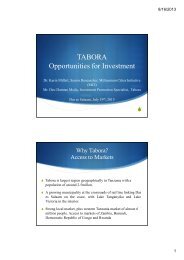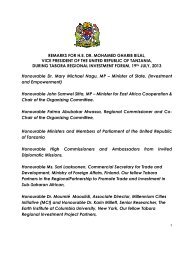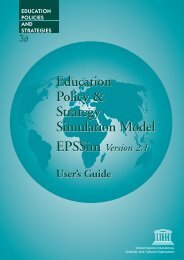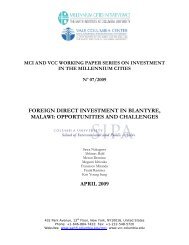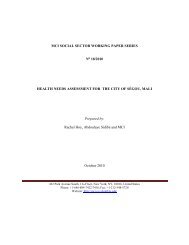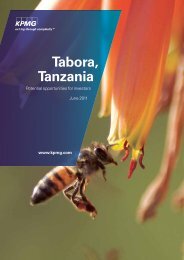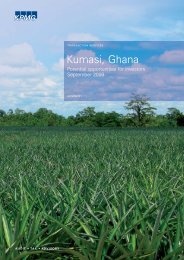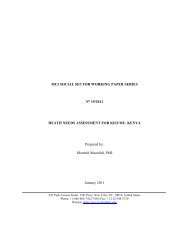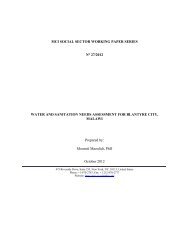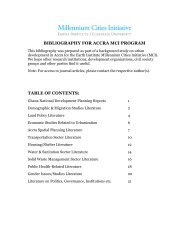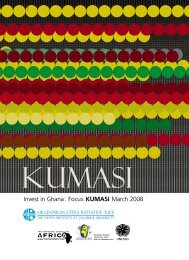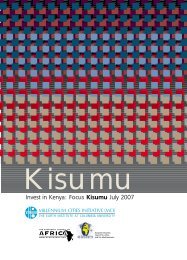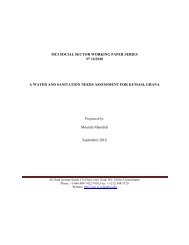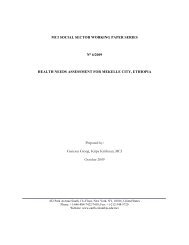Mekelle, Ethiopia - Millennium Cities Initiative - Columbia University
Mekelle, Ethiopia - Millennium Cities Initiative - Columbia University
Mekelle, Ethiopia - Millennium Cities Initiative - Columbia University
Create successful ePaper yourself
Turn your PDF publications into a flip-book with our unique Google optimized e-Paper software.
34 <strong>Mekelle</strong>, <strong>Ethiopia</strong>: Potential Opportunities for Investment<br />
Meat production value chain, 2008<br />
Source: KPMG in <strong>Ethiopia</strong> interview prog ramme, 2009<br />
Note: KT – thousand tonnes<br />
Live animals Fresh, chilled or frozen meat Processed meat<br />
Price in the local market US$0.6–0.8 per kg US$3 per kg US$4.5 per kg<br />
Volume of import 0 KT 0 KT<br />
Price in the export market US$1.2 per kg US$3.5 per kg<br />
Volume of export 43.4 KT 8 KT<br />
Challenges<br />
The instability of<br />
live animal supply,<br />
especially during the<br />
rainy season (June<br />
and July), is the<br />
major constraint for<br />
meat production.<br />
The large amount of<br />
informal cross-border<br />
trade considerably<br />
hampers the legal<br />
market.<br />
The government’s priority<br />
is to increase the<br />
value-added chain in the<br />
meat industry and shift<br />
export of livestock<br />
products from live<br />
animals to value-added<br />
meat products.<br />
Export of chilled or<br />
frozen meat yields<br />
significantly higher<br />
prices than live animals.<br />
Analysis of the value<br />
chain indicates that<br />
slaughtered animals<br />
purchased from farmers<br />
or cooperatives at<br />
US$0.8 per kg are<br />
exported at about<br />
US$3.5 per kg.<br />
The majority of households are situated<br />
in remote areas connected with unpaved<br />
roads which are washed away during the<br />
rainy season, making it very difficult for<br />
animal collectors to reach these areas.<br />
In addition, private households have a<br />
lot of feed available for their animals in<br />
the rainy season and are less likely to<br />
sell them as they are aware that a well-fed,<br />
fattened animal will fetch a higher price.<br />
© 2010 KPMG International Cooperative (“KPMG International”), a Swiss entity. Member firms of the KPMG network of independent firms are affiliated with KPMG International. KPMG<br />
International provides no client services. No member firm has any authority to obligate or bind KPMG International or any other member firm vis-à-vis third parties, nor does KPMG<br />
International have any such authority to obligate or bind any member firm. All rights reserved.<br />
0 KT<br />
US$4–4.5 per kg<br />
0 KT<br />
Low competitiveness in<br />
foreign markets due to<br />
higher production costs<br />
and lack of required<br />
labour skills.<br />
Stiff competition from<br />
other countries, such as<br />
Australia, Brazil, India<br />
and Pakistan.


